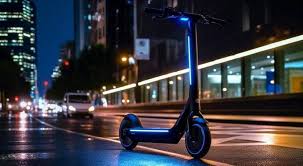In recent years, electric reparatie fatbike have transformed urban mobility, providing a convenient, eco-friendly, and often fun alternative to traditional modes of transport. As cities become more congested and environmental concerns rise, electric scooters offer a solution that combines efficiency with sustainability. This article explores the evolution, benefits, challenges, and future of electric scooters in urban environments.
The Evolution of Electric Scooters
Electric scooters have roots that trace back to the early 20th century, but their modern incarnation began to take shape in the late 2010s. The advent of companies like Bird, Lime, and Spin introduced shared electric scooter services to cities across the globe. These scooters are dockless, allowing users to pick them up and drop them off virtually anywhere, making them a flexible transport option. The rise of smartphone apps also facilitated easy access, allowing users to locate, unlock, and pay for rides with a few taps.
Benefits of Electric Scooters
- Environmental Impact: One of the most significant advantages of electric scooters is their reduced carbon footprint. Unlike gas-powered vehicles, electric scooters produce zero emissions during operation. When charged from renewable energy sources, their environmental impact is further diminished.
- Cost-Effectiveness: Electric scooters are often more affordable than other forms of transportation, especially for short trips. Users can save on fuel, parking, and maintenance costs associated with owning a car.
- Convenience and Speed: In congested urban areas, electric scooters can bypass traffic jams, making them an efficient mode of transport. Riders can often reach their destinations faster than by car or public transit.
- Health Benefits: While riding an electric scooter is less physically demanding than biking or walking, it still encourages users to be outdoors and active. Some models even come with pedals, allowing users to combine electric power with physical exertion.
- Reduced Traffic Congestion: By offering an alternative to car travel, electric scooters help decrease the number of vehicles on the road, alleviating traffic congestion and the associated pollution.
Challenges Facing Electric Scooters
Despite their advantages, electric scooters face several challenges that can hinder their adoption:
- Safety Concerns: The rise of electric scooters has led to increased accidents and injuries. Riders often face risks from traffic, potholes, and poorly maintained roads. Additionally, the lack of protective gear among many users can exacerbate safety issues.
- Regulatory Issues: Cities around the world are grappling with how to regulate electric scooters. Questions arise regarding where they can be parked, age restrictions for riders, and the need for licenses. Striking a balance between encouraging scooter use and maintaining public safety is crucial.
- Environmental Impact of Production: While electric scooters are environmentally friendly in use, the manufacturing process, including battery production and disposal, can have a significant environmental impact. Sustainable practices in production and battery recycling are essential for addressing these concerns.
- Urban Infrastructure: Many cities lack the necessary infrastructure, such as dedicated bike lanes, to safely accommodate electric scooters. Investments in urban planning are necessary to ensure safe and efficient integration of scooters into the transportation ecosystem.
The Future of Electric Scooters
The future of electric scooters looks promising, with technological advancements and changing urban landscapes paving the way for their increased adoption. Here are a few trends that may shape their future:
- Enhanced Safety Features: As the industry matures, manufacturers are likely to invest in improved safety features, such as better braking systems, built-in lights, and stability controls, making scooters safer for riders.
- Integration with Public Transit: Electric scooters can play a pivotal role in creating a seamless transportation network. By integrating scooter services with public transit, cities can offer a comprehensive mobility solution that addresses the “last mile” challenge.
- Sustainable Practices: As environmental awareness grows, companies are likely to adopt more sustainable practices in production, focusing on eco-friendly materials and battery recycling programs.
- Smart Technology: The incorporation of smart technology, such as GPS tracking, real-time analytics, and artificial intelligence, can optimize scooter usage and enhance the user experience. Features like automated maintenance alerts can also help improve safety.
- Increased Adoption: As urban populations grow, the demand for efficient and eco-friendly transportation options will continue to rise. With ongoing investments and innovations, electric scooters are poised to become a staple in urban mobility.
Conclusion
Electric scooters represent a significant shift in how we think about urban transportation. Their ability to reduce congestion, lower emissions, and offer a convenient alternative to cars makes them an attractive option for city dwellers. However, addressing safety concerns, regulatory challenges, and infrastructure needs will be essential for their long-term success. With thoughtful integration into urban environments, electric scooters can play a crucial role in creating sustainable, efficient, and enjoyable cities for everyone.

